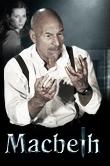Macbeth Review Gielgud Theatre 2007
This production of Macbeth by director Peter Goold and with Patrick Stewart as Macbeth, is a transfer from the Chichester Festival Theatre where it received acclaim from audiences and rapturous comments from critics.
The conceptual approach employs modernity in the weaponry department, but sets the play in what looks like an Ortonesque lavatory. Not the swish, palatial kind that Ken Livingstone has kindly had installed for the tourists in Trafalgar Square, but a rather dingy variation with white tiles long past their lavatorial prime, since they're covered in dubious-looking grime. The tiled interior doubles as military hospital, morgue, the Macbeths' ancestral kitchen, as well as a variety of other locations. At the back of the set, an old-fashioned lift (the kind with gates) carries characters into and out of the action - often combined with the now ubiquitous smoke-effect to produce an eerie and unnerving atmosphere.
Overall, Anthony Ward's design reminded me of the set for the recent revival of Harold Pinter's 'The Dumb Waiter' (February 2007). Perhaps it's the clinical colour of the tiles which seems familiar. But there's also the lift at centre stage which serves a similar function as the restaurant hoist in Pinter's piece, designed by Peter McKintosh.
In 'Macbeth', the tiles serve another purpose: to act as the screen for the highly effective video projections, particularly in the second half. When the soldiers are lurking in Birnam Wood, we almost feel we are there with them, thanks to camouflage jackets which mingle with the leaf-mottled projection in an almost surreal kind of way. The video projections are also used to show blood flowing across the stage, ranks of soldiers marching in what looks like a Soviet-style May Day parade, and the waveform of a heart monitoring machine.
Always of key interest in any production of 'Macbeth' is what the director will do with the Witches. Here, Goold has disguised them first as Nurses - stemming the blood flow of wounds on injured soldiers - and later as servants in Macbeth's household, scurrying about the dinner table and clutching daggers behind their backs. This poses something of a problem when Banquo says that the witches: "Look not like th' inhabitants o' the earth". But they're nurses, aren't they? Well, maybe not. Maybe Banquo and Macbeth are seeing something different than we are. Still, it's a symptom of the way that text grates against conception when they don't dovetail neatly.
Partick Stewart seems to have been working his way this year through the plumb roles in the Shakespeare repertoire. He's already tackled Mark Anthony and produced a fine Prospero. If those roles weren't big enough for anyone in a single year, he's now again in military gear and in tyrannical mood as general turned King, Macbeth.
The first half kicked-off in an almost matter of fact way with the King talking to one of his dying, blood-soaked soldiers in a rather cordial, chatty manner, that reminded me I had to go to see my bank manager. And when Stewart first appears - with a neatly trimmed moustache and in unmarked battle fatigues - he could easily be the next door neighbour out for a stroll in the woods. But I think this is Goold's point. At first, Macbeth is simply a (relatively) ordinary kind of person, fighting for his country and doing his duty. But when fate takes a hand and the witches foretell Macbeth's future, everything changes - for the worse.
If there was ever any question about Stewart's position as one of the country's top actors, he left us in do doubt, particularly in the second half when the play really gets into its stride, and Macbeth's guilt overcomes him. In fact, it's the transition from puzzled soldier to crazed, tyrant that is the key feature in Stewart's flawless portrayal. There's an unnerving moment or two during the feast scene where Stewart brilliantly demonstrates the unpredictable state of a tyrant's mind when he first gives a camp gesture to one of his guests in mock comedic vein, and then promptly snatches a cigarette from the mouth of another guest and crumbles it over his head.
Kate Fleetwood's fine lady Macbeth certainly convinces us that she has 'black and deep desires'. And when she says 'I fear my nature', we're rather unnerved by it too, in spite of the pinny she wears in her kitchen.
There's not much in this version of Macbeth to link it with Scotland. The setting has more in common with Eastern Europe and the days of the Stalinist regime in the Soviet Union than anywhere else, as the ranks of marching soldiers and captions in the video projections confirm. And Banquo is murdered in a train, suggestive of state-sponsored, murders by spys. But the comparison between Stalin and Macbeth isn't entirely satisfactory - if that was indeed Goold's intention. Like many other tyrants through history, Stalin seemed to sleep quite soundly in his bed in spite of the atrocities he actioned, whereas Macbeth is riddled with feelings of guilt which lead to his downfall. Perhaps Goold's point is that Macbeth is not made of quite the same stuff as your typical tyrant.
I wouldn't go quite as far as some other reviewers in describing this production of Macbeth as historic or definitive, but it is an excellent production with fine performances and inventive direction.
What the popular press had to say.....
NICHOLAS DE JONGH for THE EVENING STANDARD says, "Macbeth of a lifetime ...This historic production enjoys a perfect thrill-factor." MICHAEL BILLINGTON for THE GUARDIAN says, "Spellbinding...A traditionally difficult play is magnificently realised." CHARLES SPENCER for THE DAILY TELEGRAPH says, "Patrick Stewart...giving a truly great performance in Rupert Goold's brilliantly inventive, heart-stoppingly scary production...this is the greatest production of Macbeth I have ever seen." BENEDICT NIGHTINGALE for THE TIMES says, " Isn't it desperately busy and sometimes distractingly fussy?"
External links to full reviews from popular press
Guardian
The Times
Daily Telegraph
Originally published on
